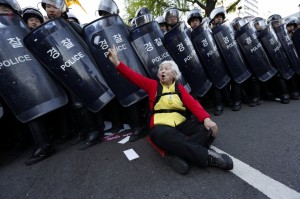Tens of thousands of unionized workers marched across South Korea yesterday & are regrouping to continue protests today. Media reports are vague about the issues but they appear to be the same issues igniting protests across the globe: the government is modifying labor laws to make it easier to fire people & is cutting back pensions. Protesters are also demanding an increase in the minimum hourly wage from 5,580 won (US $5.18) to 10,000 won ($9.10).
The proposed pension cutbacks would affect government workers as well as workers in the chaebol which are business conglomerates unique to South Korea. Chaebol were formed in the 1960s under the military dictatorship of Park Chung-hee who was an ally of the US. They are immense monopolies owned, controlled, & managed by family dynasties. They are integral to the functioning of the government & to the massive repression of worker’s rights. They aren’t just corporate conglomerates but in many ways pioneered neoliberal business strategies including sweatshops & export-oriented markets. In most countries the ruling elite hide behind minions who run their corporations but in South Korea oligarchic rule is more direct. Samsung, Hyundai, & LG Group are among the biggest & most important chaebol.
Chaebol under the military dictatorship are attributed with transforming the South Korean economy from agrarian to industrial, to an export economy, & raising the standard of living. Economic indices seem to bear that out except that they’re mostly cheat sheets for capitalists & only if sweatshops are considered a measure of economic well-being. There have been repeated farmer protests in South Korea over export of their produce & the flooding of markets with US products. South Korea has free trade agreements with the US, European Union, Canada, Australia, China. Those are sweatshop agreements.
A more telling index is the over a million homeless people just in Seoul & reportedly islands where the disabled, unemployed, & homeless are forced to work as slaves. The most telling index is that South Korean unions long-compromised with the autocratic regime feel compelled to mobilize their ranks against the latest assaults on workers’ rights.
Our fullest solidarity with the working people of South Korea.
(Photo by Jeon Heon-Kyun/EPA)
